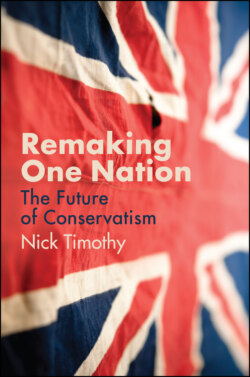Читать книгу Remaking One Nation - Nick Timothy - Страница 10
Behind the scenes
ОглавлениеAt the best of times, political parties find it difficult to renew themselves several years into government. If they are honest about problems that need fixing, the media and opposition ask why these things have not been fixed already. If they acknowledge past mistakes, their supporters criticize them for trashing their own record. If they change policies to suit the needs of the day, they are accused of U-turning. If they do any of these things quickly, without a longer conversation about the government’s direction, they encounter resistance within their party. If they take time to build a consensus, they are accused of dithering. Former ministers and their allies guard their legacies jealously, and are quick to denounce perceived slights.
Prime ministers who arrive in Downing Street from opposition have usually had the time and space to develop their ideas and arguments. They can build up their policy programmes, and establish coalitions of supporters among experts, academics and journalists. New prime ministers who arrive straight from a government department have no time to do any of these things. They are thrust into Number Ten with no transition and little or no time to prepare their agenda.
The bold approach Theresa set out in the Downing Street and party conference speeches needed an equally bold policy programme. But here there was another problem. There was no mandate for a break with David Cameron’s agenda. There had been little time to debate policy during the truncated Conservative leadership election. And several senior ministers opposed change. In particular, Theresa’s Chancellor, Philip Hammond, refused to change fiscal policy and opposed reforms to corporate governance and competition policy. ‘You don’t need to actually do any of this stuff’, he once said with a trademark smirk, ‘you’re miles ahead in the polls just talking about it.’
Theresa’s relationship with Hammond was especially bad. At the point at which she made him her Chancellor, she believed she had a good personal relationship with him. But within weeks their relationship was bitter and rancorous. He showed little respect for Theresa or her intellect. He briefed the newspapers that she was ‘economically illiterate’, and he said the same about me. In his first Budget, he insisted on increasing National Insurance contributions for self-employed workers, against Theresa’s advice and breaking a promise in the 2015 election manifesto. His response to the backbench rebellion he caused was not to show contrition but to become even more obstreperous and aggressive in his briefing against Number Ten.
Theresa’s relationships with other ministers were little better. She got on badly with Justine Greening, Sajid Javid and Boris Johnson. Looking back, her relations with colleagues were often poor because she neither trusted them nor even knew them particularly well. She would often patronize Boris and put him down in front of his colleagues.
And what makes a minister successful running a government department – even a department as important as the Home Office – will not necessarily translate to Number Ten. In the Home Office, Fiona and I were able, on Theresa’s behalf, to maintain a tight grip on departmental business. We were equals in everything we did, and worked fluidly across policy, political work, strategy and communications. In Number Ten, we tried and failed to work in the same way. Our status as joint chiefs of staff sometimes caused confusion in the command chain. With notable exceptions like JoJo Penn, James Slack, Will Tanner and Chris Wilkins, we did not build a strong enough senior team to delegate with confidence. We neglected our managerial duties because our other responsibilities overwhelmed us.
Compared to life in a department, the job in Downing Street is much more about setting a strategy and allowing ministers to deliver it, coordinating efforts across departments, solving problems and ensuring delivery, and constant, human communication. The complaint that Theresa – and we, her senior advisers – brought too much of the Home Office into Number Ten was justified. The role of the prime minister is not to play every instrument in the orchestra, but to write the score and conduct the musicians. Too often, Theresa was trying to play the strings, woodwind, brass and percussion all at the same time.
Yet she often backed down when confronted by opposition. She promised to ‘repair the dysfunctional housing market’, but was too nervy about agreeing the policies that would get more houses built.6 She wanted ‘an energy policy ... [with] lower costs for users’, but ended up supporting unilateral climate change policies that will increase bills for households and industry.7 When Hammond and others objected to her policies, she watered them down or gave up on them altogether. On each occasion I tried to convince her to change fiscal policy, she refused to do so. Only once the election had been lost did she accept the need to call time on the age of austerity.
